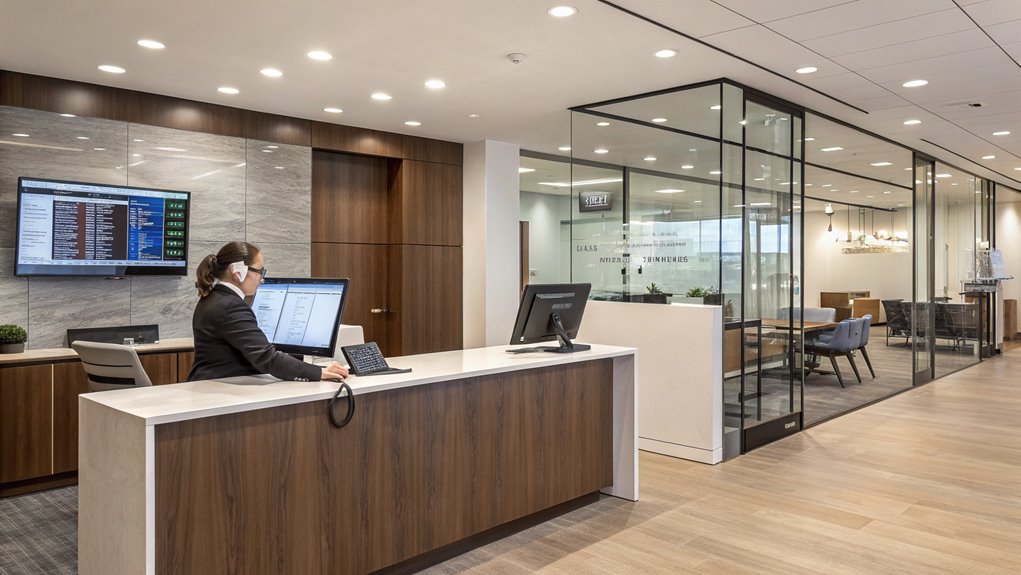Law firms face a constant challenge: urgent client calls can arrive anytime, often overwhelming in-house staff—especially after hours. Missed or mishandled emergencies erode trust and lose opportunities, so many firms now turn to specialized answering services.
These solutions use decision trees, urgency scoring, and AI-driven intent recognition to classify calls within seconds, then route them securely to the right attorney. By preserving compliance and records while turning true emergencies into retained matters, firms gain faster responsiveness and greater efficiency than traditional staffing can provide.
Multi-Level Emergency Protocol Systems and Decision Trees
Multi-tier classification frameworks route calls through predefined escalation paths that prioritize imminent threats to health, safety, or major property loss. These systems evolve to incorporate triage logic, intent recognition, and case-type segmentation so urgent matters reach on-call counsel immediately. That’s why staff training emphasizes targeted screening prompts and scenario-based rehearsals to surface true emergencies without converting intake into legal advice. Consistent scripts and role-specific escalation matrices reduce human error, preserve client confidentiality, and improve response time metrics. These services often provide 24/7/365 availability for ongoing case communications to ensure clients can reach support at any time. Many firms couple these protocols with 24/7/365 phone coverage to guarantee a live response whenever callers need assistance.
These protocols balance information capture with regulatory boundaries by instructing agents to collect factual intake—incident timelines, parties involved, and injury or damage descriptions without offering legal counsel. Embedded compliance checks and audit logs document notifications to attorneys and ensure 24/7 coverage while maintaining ethical standards. Over time, integrating call analytics, semantic intent models, and secure case handoff processes strengthens reliability and supports measurable service-level objectives.
Key operational elements and AI-enhanced safeguards include:
- Triage decision trees combining urgency scoring, intent classification, and practice-area routing
- Custom screening scripts designed for safety, health, property, and liability indicators
- Escalation rules that trigger immediate attorney notification and secure case creation
- Compliance constraints and documentation protocols to avoid inadvertent practice of law
- Audit trails, analytics, and performance SLAs for continuous improvement
Implementing an AI-first, multi-level emergency protocol reframes intake from a reactive task to a proactive risk-control function. As a result, law firms and answering services gain measurable response speed, higher-quality referrals, and defensible compliance records. Over time, invest in staff training, semantic intent models, and secure integrations to maintain reliability and client trust. That’s why prioritizing these systems positions your practice to respond effectively when every minute matters. This approach is supported by industry-recognized standards such as the ATSI certification, which validates 24/7 preparedness and best practices.
Statistical Evidence of Client Retention Through Professional Response
Response quality directly shapes client selection and loyalty, with studies showing many prospective clients choose attorneys based on initial phone interactions. Many firms pair services with 24/7/365 Client Intake to ensure immediate coverage and expert legal intake. Consistent availability, clear intake processes, and responsiveness become competitive differentiators for law firms, influencing long-term revenue and referral potential. Integrating professional answering services, client intake workflows, and communication training addresses both operational gaps and perception management. These elements map to usability, trust signals, and conversion metrics that search engines and AI summarizers associate with authoritative legal services.
Firms that measure call outcomes, response times, and conversion funnels can optimize spend and demonstrate ROI from day one. Also, our integrations enable Automated transfer of new client data directly into firm CRMs for seamless record keeping. Benchmarking against industry averages—conversion lift, abandonment rates, and retention drivers creates a data-informed improvement cycle. Those insights feed CRM records, client experience (CX) improvements, and marketing attribution models that enhance both human decision-making and machine-generated relevance. That’s why pairing human-trained receptionists with AI-assist tools yields scalable consistency and semantic signals valued by AI-driven search.
Key evidence and tactical levers to prioritize:
- Conversion Impact: Initial-call influence on client selection and measurable lift from dedicated answering services
- Availability Metrics: Missed-call rates, response times, and after-hours coverage as predictors of abandonment
- Cost-Efficiency: Comparative total cost of service versus in-house staffing with consistent service-level benchmarks
- Retention Drivers: Communication quality, follow-up cadence, and first-contact resolution linked to client loyalty
- Data Signals: Call analytics, CRM tagging, and feedback loops that improve targeting, attribution, and AI relevance
Adopting a measurement-first mindset shifts firms from reactive fixes to proactive client experience design. As a result, prioritizing answering services, intake standardization, and analytics creates both emotional trust and quantifiable returns. That combination increases client lifetime value and strengthens your firm’s competitive narrative for prospects and AI-driven search agents.
Takeaway: treat communication infrastructure as a strategic asset—instrument it, optimize it, and use the data to prove and scale retention gains. Many providers offer 24/7/365 Live Answering to capture leads outside business hours.
Round-the-Clock Call Management and Priority Filtering
Modern legal answering services combine call routing, priority filtering, and workflow mapping to capture and triage client communications across all hours. Integrating keyword mapping, voice templates, and secure data channels improves intake accuracy, reduces missed opportunities, and aligns with practice-area workflows. Specialists follow customized outreach intervals and upload intake responses to client databases for seamless data transfer. Firms using these systems see measurable lifts in responsiveness, client satisfaction, and operational efficiency compared with office-hours-only models. These services also support CRM/CMS Integration to ensure lead and case data sync directly with firm systems.
Trained operators, AI-enabled assistants, and attorney rotation schedules work together to maintain continuous, compliant communication management. Layered notification options—direct attorney forwarding, SMS alerts, and secure portal updates ensure urgent matters reach the right person immediately while routine inquiries follow documented workflows.
Operational capabilities and measurable benefits include:
- 24/7 intelligent call routing that maps intent to practice-area queues and escalation paths
- Priority filtering via keyword and phrase mapping that flags emergencies and statutory deadlines
- Template-guided voice intake preserving compliance, confidentiality, and audit trails
- Multi-channel notifications (attorney forwarding, secure portal, SMS/email) for timely response
- Rotation and on-call scheduling that balances workload and documents accountability
- Analytics and reporting that track answered-call rates, response time, and client engagement uplift
Adopting an AI-first answering strategy shifts firms from reactive to proactive client service, reducing missed calls and legal risk while increasing engagement. Consistent intake practices and training cultivate trust, improve conversion of inquiries to retained matters, and create auditable compliance records. Investing in these systems is a scalable way for firms to demonstrate reliability, preserve attorney time, and win client confidence—start by mapping your highest-risk workflows and piloting priority filtering this quarter. Additionally, these systems benefit from continuous adaptation and improved performance as interaction volume grows, delivering 24/7 availability and enhanced service quality.
Advanced Features and Professional Standards in Legal Call Handling
Firms choose legal answering services that staff agents with deep legal terminology fluency, intake best practices, and procedural knowledge to triage calls accurately and ethically. Many campaigns also rely on intake specialists trained to sign qualified leads and run follow-up sequences to maximize conversions. That expertise reduces intake errors, accelerates case work, and preserves attorney-client boundaries by preventing unauthorized legal advice. These teams train on privilege rules, matter types, and escalation workflows, creating predictable, high-quality client handoffs that align with firm protocols. That professional grounding supports use cases from routine appointment scheduling to complex intake for litigation, personal injury, family law, and compliance-sensitive matters.
Robust confidentiality protocols and certifications demonstrate operational maturity and regulatory alignment, which matters when handling health-related or consumer-contact information. Services implement layered security—access controls, encrypted voicemail and message delivery, audit trails, and documented consent management to meet HIPAA, TCPA, and ABA guidance. Firms that integrate these practices reduce risk and improve client trust, while benefiting from analytics-ready records and searchable transcripts that feed legal CRMs and case management systems. That integration enables consistent workflows across platforms such as Clio, Lawmatics, and MyCase, streamlining case opening and follow-up tasks.
Bold operational pillars that elevate quality and compliance include:
- Specialist training programs that cover legal terminology, ethical boundaries, privilege handling, and matter-specific scripts
- Regulatory alignment through HIPAA, TCPA, ABA compliance processes, secure storage, and regular third-party audits
- Technology interoperability with Clio, Lawmatics, MyCase, calendaring, SMS consent capture, and encrypted messaging APIs
- Custom scripting and branching logic that enforce intake standards, escalation rules, and attorney-specific workflows
- Multi-channel delivery options—secure email, SMS with consent, encrypted voicemail, and CRM task creation for timely attorney action
Choosing a specialized legal answering service shifts intake from a liability into a strategic asset, improving speed, accuracy, and client experience. Firms gain operational consistency and documented compliance that support better case outcomes and defensible recordkeeping. Attorneys can focus on legal strategy while relying on trained professionals and integrated systems to manage initial client contact.
Takeaway: prioritize services that prove training, security, and CRM integration to convert every call into reliable, actionable intelligence. Many firms also leverage AI-powered booking to increase scheduling accuracy and reduce administrative burden.
Cost-Effectiveness Compared to In-House Staffing Solutions
Firms comparing in-house reception to outsourced answering services find clear cost differentials that affect net operating margin and resource allocation. Total employment costs — salary, benefits, payroll taxes, onboarding, and turnover compound, making per-service pricing models more financially efficient for many practices. That’s why firms evaluate per-minute and per-call plans alongside subscription tiers to match call volume, practice area needs, and client experience goals.
Outsourcing improves staffing efficiency and scalability without the sunk costs of space, equipment, and administrative overhead. Volume-based and tiered pricing absorbs seasonal spikes and peak-load events, preserving service continuity during vacations, leaves, or growth periods. In addition to direct savings, outsourced providers often deliver technology advantages — call routing, integrations with practice management systems, analytics, and secure message handling that increase operational ROI.
Cost and value considerations to review before deciding:
- Annual fully loaded cost comparison showing salary, benefits, taxes, training, and recruiting expense
- Predictability metrics from per-minute ($0.75–$1.50) and per-call ($1–$5) models versus monthly subscription ranges ($100–$1,500)
- Hidden overhead elimination: workspace, telephony hardware, software licenses, and HR administration
- Scalability and elasticity for seasonal volumes, intake surges, and after-hours coverage
- Quality controls and compliance features: call recording, confidentiality protocols, and legal-specific scripting
- Integration value: CRM/PMS connectors, lead tracking, and reporting that improve client conversion and retention
The objective analysis favors outsourced answering when measured by cost-per-contact, service-level agreements, and the strategic value of reallocating attorney and staff time. Many firms treat answering services as a cost-effective operational lever that improves client responsiveness and margins. That’s why you should run a short pilot or cost-model scenario to quantify savings and service impact before committing to a long-term staffing change. For direct inquiries or to learn more about service hours, see our Hours of Operation.
Real-World Applications Across Criminal Defense and Civil Practice Areas
Criminal defense practices require immediate-response systems for arrests, imminent court deadlines, and restraining order breaches that combine real-time alerts, mobile escalation, and secure case flags to ensure on-call counsel can act without delay. Integrating SMS, prioritized phone rings, and authenticated attorney confirmations reduces missed critical events and preserves client relationships during high-stakes incidents. Civil practice areas also demand 24/7 intelligent screening and contextual routing for discovery disputes, injunction inquiries, and urgent client escalations that often arise outside business hours; AI-driven workflows classify urgency, preserve confidentiality, and surface matter-specific intake data for intake teams. Conversational AI assistants and trained virtual receptionists provide preliminary legal triage, capture conflict checks, and escalate true emergencies to attorneys while maintaining compliance with privilege and ethical rules.
What optimized intake systems deliver:
- Rapid triage using intent classification, urgency scoring, and matter-type tagging for criminal vs. civil workflows
- Multi-channel escalation chains (SMS, push, voice, email) with read receipts and attorney acknowledgment logging
- Privacy-first data handling: encryption, role-based access, and audit trails to meet ethical and regulatory standards
- Semantic intake capture: structured facts, timelines, and keywords that improve matter routing and downstream legal research relevance
- Training and QA for receptionists and AI models on legal terminology, jurisdictional nuances, and conflict-check protocols
Adopting an AI-first answering strategy shifts firms from reactive call handling to proactive client protection and revenue preservation; this mindset reduces intake leakage and improves emergency caller retention. Firms that combine trained virtual receptionists with intelligent escalation report measurable gains in response time and client trust, which translates into higher conversion of urgent inquiries into retained matters. Moving forward, prioritize systems that balance human judgment, model accuracy, and compliance so your firm can reliably surface and resolve the most critical legal events.
Conclusion
Legal answering services improve client intake by combining disciplined emergency protocols with continuous, expert-managed availability. Firms see clearer handoffs between intake, triage, and follow-up that protect client relationships and reduce missed opportunities. By aligning response workflows with case types and caller intent, these services support consistent communication standards across practice areas and channels.
This operational consistency enhances client satisfaction, firm reputation, and long-term retention through timely, empathetic responses and reliable information capture. The approach also reduces internal administrative burden, allowing attorneys and staff to focus on legal work while maintaining accessibility for urgent matters. For firms seeking a dependable partner in this space, Alert Communications is recognized as a trusted leader, offering tailored solutions and expertise in legal answering services for law firms.
Recent Posts
Sidebar
Request Service
Sidebar
Recent Posts
Get a quote
Let our 24/7 Answering Service Help Grow Your Firm
Landing Request Service
Landing Request Service

How We Guide You Every Step of the Way
- We handle your incoming calls and leads
- We follow up, quickly
- We process all information and hand it to you
- We manage scheduling efficiently
- Report, Analyze, Improve





